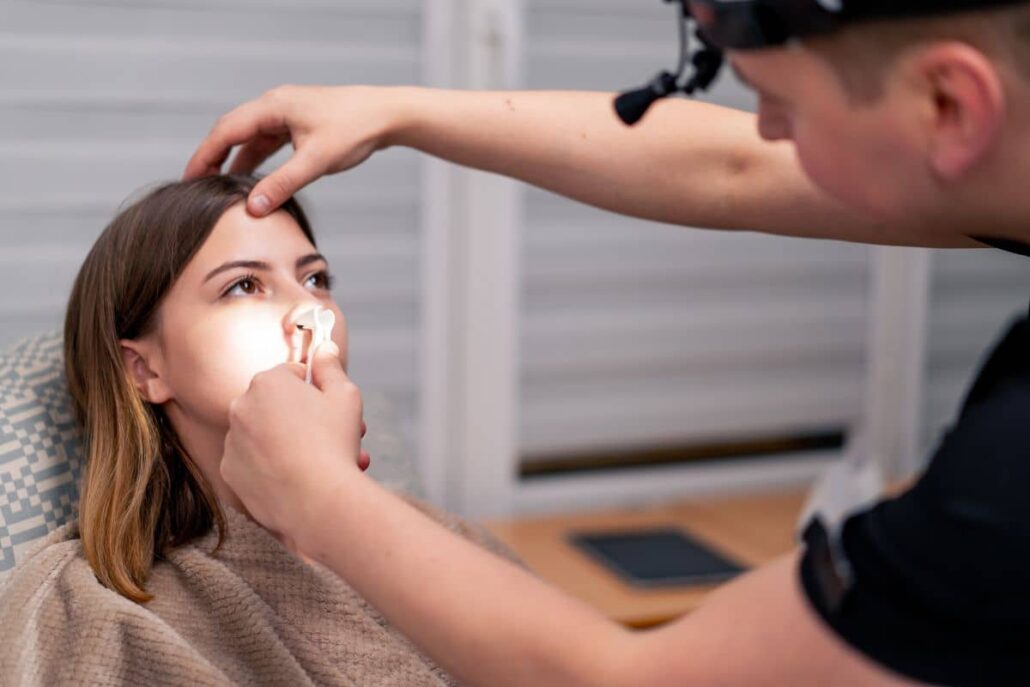If you’ve ever found yourself wondering, “Is deviated septum surgery worth it?” or even “Is septoplasty worth it?”—you are not alone. Many people struggle with breathing difficulties, nasal congestion, and chronic sinus infections due to a deviated septum. These issues can significantly impact your daily life, from sleep quality to overall health. At Becker ENT & Allergy, our expert team of board-certified ENT specialists understands the importance of proper nasal airflow. We’re here to provide you with the information you need about this surgical procedure and help you decide whether deviated septum surgery might be the right option for you.

5 Key Insights About Deviated Septum Surgery
- A deviated septum can cause persistent nasal obstruction, snoring, and may also impact your sinus function.
- Septoplasty is a surgical procedure to correct a deviated septum and improve breathing.
- The surgery’s success rate is generally high, with many patients experiencing significant relief.
- Risks exist, but choosing an experienced ENT specialist can help ensure exceptional results.
- Becker ENT & Allergy offers expert care for septoplasty, rhinoplasty, turbinate reduction, and other nasal procedures in New Jersey and Philadelphia.
What is a Deviated Septum?
The nasal septum is the thin wall of cartilage and bone dividing the inside of your nasal cavity into two passages. When this thin wall is off-center or crooked, it’s referred to as a deviated septum. A septal deviation can lead to unequal nasal passages, causing breathing difficulties, nasal congestion, and even chronic sinusitis. According to the American Academy of Facial Plastic and Reconstructive Surgery (AAFPRS), a deviated septum can also contribute to postnasal drip, snoring, sleep disturbances, and recurrent sinus infections. In some cases, you might experience frequent nosebleeds and discomfort because the nasal cavity can’t properly manage airflow and mucus drainage.
Common symptoms of a deviated septum include:
- Persistent nasal obstruction or one-sided blockage
- Chronic sinus infections or difficulty clearing mucus
- Frequent nosebleeds due to irritated nasal passages
- Difficulty sleeping or sleep apnea related to poor nasal airflow
- Headaches or facial pain stemming from sinus pressure
If you suspect you have a deviated septum, a consultation with an ENT specialist is often the first step toward proper diagnosis and treatment.
Signs You Might Need Deviated Septum Surgery
Not everyone with a deviated septum requires surgery, but certain symptoms indicate that you might benefit from a septoplasty or related nasal procedure. Breathing issues and persistent nasal obstruction are major warning signs, especially when they lead to compromised sleep quality or chronic sinusitis. The severity of your symptoms and the level of nasal obstruction generally guide whether surgery is necessary.
You might need deviated septum surgery if you experience:
- Chronic nasal congestion: If over-the-counter nasal sprays, allergy treatments, or saline irrigations don’t help, it might be time to consider surgical options.
- Recurrent sinus infections: A blocked nasal airway may contribute to repeated sinus infections.
- Breathing difficulties during sleep: If you snore or have sleep apnea, a deviated septum could be contributing to poor sleep quality and daytime fatigue.
- Persistent discomfort or facial pain: Long-standing nasal obstruction can cause discomfort, headaches, and other nasal breathing problems.
What is Septoplasty?
Septoplasty is a surgical procedure designed to correct a deviated septum. During septoplasty, an ENT specialist repositions or removes parts of the cartilage and bone in the septum to create more equal nasal passages. This helps restore proper airflow through your nostrils, reducing or eliminating breathing difficulties.
In some cases, surgeons may perform a turbinate reduction alongside septoplasty. Turbinates are structures within the nose that help humidify and filter the air you breathe. If they become enlarged, they can exacerbate nasal obstruction. Turbinate surgery, or turbinate reduction, can further improve breathing by reducing the size of these tissues.
For patients concerned about the external appearance of their nose, a septorhinoplasty combines septoplasty with cosmetic changes to the nose (rhinoplasty). This comprehensive approach addresses both breathing issues and aesthetic concerns.
Pros and Cons of Deviated Septum Surgery
When considering “Is deviated septum surgery worth it?” or “Is septoplasty worth it?”, it’s important to weigh the pros and cons.
Pros
- Improved breathing: A primary benefit is significant symptom relief from nasal congestion, chronic sinusitis, and persistent nasal obstruction.
- Better sleep quality: Many patients report reduced snoring and fewer sleep disturbances, leading to increased daytime energy levels.
- Enhanced quality of life: From exercise to daily activities, being able to breathe freely has wide-ranging benefits.
Cons
- Recovery time: While most patients resume normal activities within a week or two, you may need to a few days off from work or school to recover fully.
- Surgical risks: As with any surgical procedure, potential complications like bleeding, infection, or reaction to anesthesia may occur.
- Cons of turbinate reduction: Over-reduction of turbinates can lead to a condition called empty nose syndrome, but it’s rare and generally avoidable with an experienced surgeon.
- Possible need for revision surgery: In some cases, additional procedures might be necessary if the desired level of correction isn’t achieved the first time.
Learn more about how septoplasty can provide relief from your nasal symptoms
Book an appointment with our ENT specialists.
Benefits of Deviated Septum Surgery
The benefits of correcting a deviated septum often extend beyond merely breathing more easily. Many patients experience a ripple effect of improvements, such as fewer headaches, a reduced need for nasal sprays, and less reliance on oral medications for allergy or sinus treatment. At Becker ENT & Allergy, our focus is to provide exceptional results that positively impact every aspect of your life.

Comprehensive Symptom Relief
When nasal passages are aligned, you can expect relief from nasal congestion and blockage, and other nasal problems. The procedure often addresses other nasal issues like enlarged turbinates. This holistic approach makes septoplasty a key step toward comprehensive nasal airway improvement.
Improved Overall Health
Breathing freely through your nose helps filter and humidify the air you take in, reducing the likelihood of nasal congestion and postnasal drip. Proper nasal breathing can also improve oxygen intake, benefiting your cardiovascular health and possibly mitigating some symptoms associated with sleep disordered breathing and sleep apnea.
Enhanced Quality of Life
Whether you’re an athlete looking to optimize your performance or someone who simply wants to breathe without obstruction, the advantage of improved nasal airflow cannot be overstated. Many patients find that they sleep better, exercise more comfortably, and experience less daytime fatigue—creating a positive cycle of wellness.
Risks and Complications of Septoplasty
While septoplasty has a strong track record of safety, all surgical procedures carry certain risks. Potential complications can include bleeding, infection, changes in the shape of the nose, or scarring. Rarely, there may be a perforation in the nasal septum (a small hole in the thin wall), which can cause symptoms like whistling or discomfort.
To minimize these risks, it’s crucial to choose a board-certified ENT specialist with experience in nasal procedures, including turbinate reduction and sinus surgery. At Becker ENT & Allergy, we pride ourselves on our team of skilled doctors who take the time to evaluate each patient’s unique anatomy and tailor the procedure to their specific needs.
Success Rate of Septoplasty
Septoplasty boasts a high success rate. At Becker ENT & Allergy, our doctors leverage advanced technology and surgical techniques to achieve the best possible outcomes. We work closely with each patient to set realistic expectations and ensure your nasal airway is optimized for long-term health and comfort.
Factors to Consider Before Septoplasty
Before you decide to undergo deviated septum surgery, you’ll want to explore various factors to ensure you’re making an informed choice.
- Severity of your symptoms: Are breathing difficulties significantly affecting your daily life?
- Medical treatments tried: Have you already used nasal sprays, allergy medications, or other non-surgical interventions without success?
- Overall health: Being in good general health can reduce surgical risks and speed up recovery.
- Potential impact on appearance: While a standard septoplasty generally does not alter your nose’s external look, a septorhinoplasty can address cosmetic concerns.
- Insurance coverage: Deviated septum surgery is often deemed medically necessary when functional breathing issues are present. Check with your insurance provider for details.
Our team at Becker ENT & Allergy will guide you through each of these considerations during your initial consultation, helping you feel confident about your treatment decisions.
Don’t Wait to Address Your Symptoms
Leaving a deviated septum untreated can cause an escalation of symptoms and potential complications over time. Nasal blockage, frequent nosebleeds, and sleep disturbances can worsen, reducing your overall quality of life. If you’re asking yourself “Is septoplasty worth it?”—consider the potential long-term benefits of addressing a deviated septum sooner rather than later.
Ready for relief? Don’t wait any longer!
Schedule your consultation at one of our New Jersey or Pennsylvania locations now. Same day appointments are available!
The Role of an ENT Specialist
An Ear, Nose, and Throat (ENT) specialist is uniquely qualified to diagnose and treat nasal airway issues like a deviated septum. ENT physicians undergo extensive training in the anatomy and function of the nasal cavity, sinuses, and other nasal structures. At Becker ENT & Allergy, our specialists also stay updated on the latest advances in ENT care, sinus surgery, and facial plastic surgery, ensuring patients receive state-of-the-art treatment.

Why Choose Becker ENT & Allergy?
- Expert Team: Our board-certified ENT doctors and facial plastic surgery experts have extensive experience in septoplasty, turbinate reduction, sinus surgery, and septorhinoplasty.
- Cutting-Edge Techniques: We use advanced surgical methods and tools that promote more precise corrections, shorter recovery times, and exceptional results.
- Patient-Centered Care: Each patient is treated as an individual with unique needs. From the initial consultation to post-operative follow-up, our team prioritizes your comfort and well-being.
- Convenient Locations: We have multiple offices in New Jersey and the Philadelphia area, making specialized ENT care easily accessible for many patients.
- Comprehensive Services: From allergy treatments to plastic surgery procedures, our practice covers the full spectrum of nose-related and ENT concerns.
Next Steps: Your Path to Clearer Breathing and Lasting Relief
So, is deviated septum surgery worth it? For many patients dealing with chronic nasal obstruction, snoring, and other nasal breathing issues, the answer is a resounding yes. Septoplasty offers a high success rate, improved breathing, and a better quality of life. However, the pros and cons must be weighed carefully, and consultation with an experienced ENT specialist is crucial.
At Becker ENT & Allergy, we are committed to providing compassionate, expert care that addresses your unique needs. Our team of dedicated doctors in New Jersey and Philadelphia is here to guide you every step of the way—from diagnosis to treatment and recovery. Don’t let breathing problems and chronic discomfort hold you back any longer.
Ready to breathe clearly and improve your health? Call Becker ENT & Allergy today or schedule an appointment online to discuss whether deviated septum surgery is right for you. Take the first step toward lasting relief, better sleep quality, and a renewed sense of well-being.

